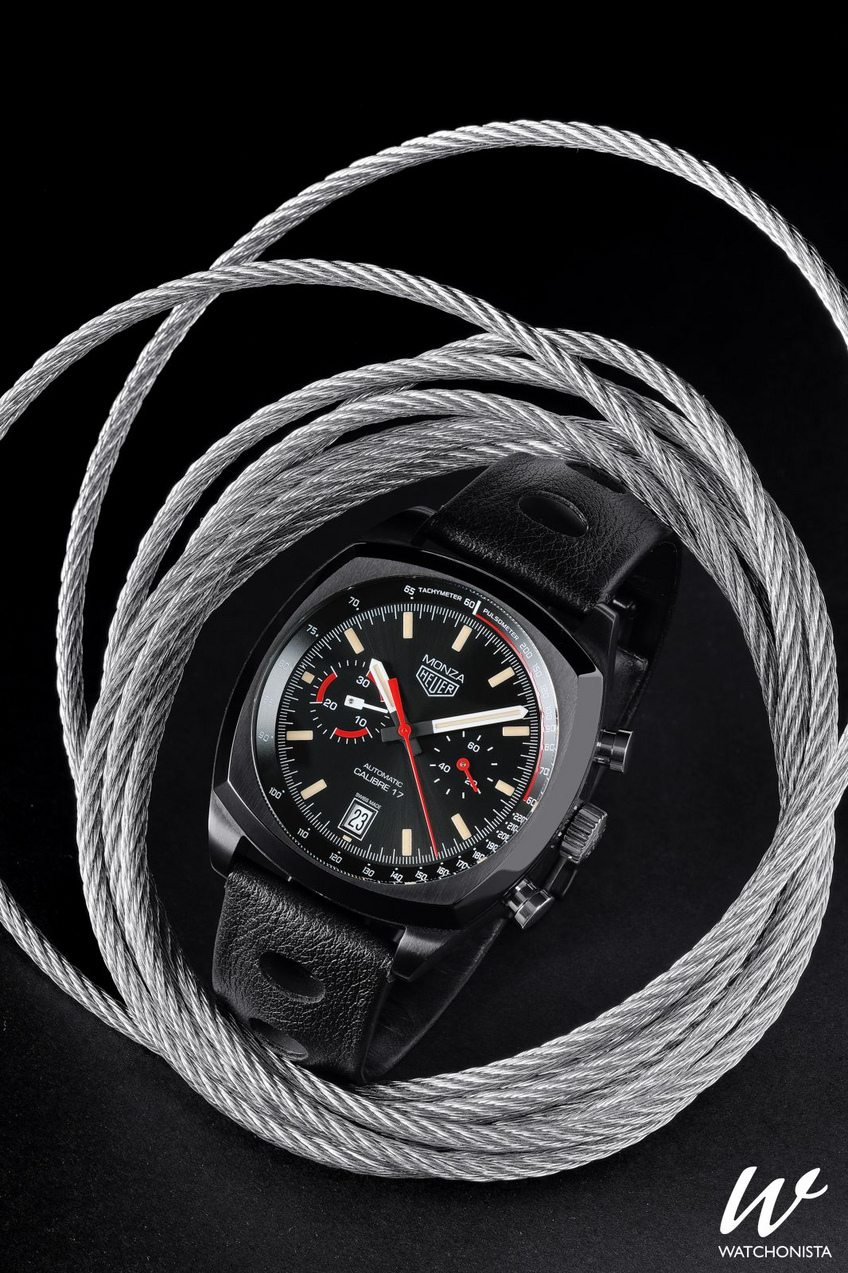
The Heuer Monza scoops an award in the GPHG Revival category for its funky vibe
The new Heuer Monza by TAG Heuer revives an ancient glory in superb style. The third version of an incredibly rare competition watch with coussin-shaped case has just bagged a prestigious prize.
The Revival prize at the Grand Prix d’Horlogerie de Genève 2016 has just been awarded to a reincarnated icon of watchmaking in the presence of its creator, Jack Heuer, who gave a touching and eloquent speech in acceptance of the award.
Many collections over the past 15 years have featured reissues of old models by watchmaking brands. In the deft hands of the master craftsman, the new remake is often transformed into a must-have item that rids the shackles of its past to become a success in its own right. It is a delicate exercise and TAG Heuer is no newcomer to the scene, having successfully relaunched the Monaco 13 years ago, a square chronograph that was aesthetically peculiar and powerful in equal measures. The reissue of the Heuer Monza, which was presented again in 2000 and relaunched at Baselworld, has just met with the same happy fate. What's more, it has garnered particular attention for its many subtle references to the original, but, more importantly, it packs a welcome modern punch. We take a closer look.

A welcome act of rebellion
The first sketches for the Heuer Monza were penned in 1976 by Jack Heuer, a descendant of the brand's founder. Jack had come up with a new watch to congratulate Austrian racing car driver, Niki Lauda, on winning the world champion title. The design made quite an impact, comprising a chronograph featuring a coussin-shape (albeit more tonneau-shaped in its initial version) and sporting a round dial in a square housing. This exquisite and intriguing shape is now reserved for more precious, classic, no-frills models. By giving this great sports classic a newer, more unusual form, Heuer was sending out a subtle statement of rebellion. The Heuer Monza has since had the privilege of being included among the ranks of the Omega 'Bullhead', while still retaining its exotic appeal, a fact that makes it all the more remarkable.
Titanium case
The model has remained true in spirit to the original 70s version, but the casing and motor have naturally been updated, beginning with the choice of titanium for the 42mm diameter case. Solid, lightweight, on-trend and coated in black PVD, with a finish that wavers between polished and satin. Apart from the fact that titanium is a more difficult material to work with due to its hardness, alternating between the finishes in this way confers a certain stylish chic. In a unique, somewhat unusual, departure, the pushpieces and crown have retained the grey shimmer of the steel from which they are blanked. A choice that, paradoxically, strengthens the already strong lines of the case.
The same balancing act can be seen throughout the watch. It is as if forever steeped in an era fuelled by funky, rock ’n roll vibes, while remaining insistent upon modern-day codes, as seen in the luminescent colour touches to the indices. While the remaining colour scheme is bold, tonic and identical to the shades used in the first version, featuring a stunning blood red for the hands and measurement scales in particular, the indices boast the vintage orange patina of old paintwork. These subtle visual variations add vim and vigour to the design of the piece.
Pulsations and speed
But perhaps the most cleverly subtle aspect of the Heuer Monza dial is the double measurement scale on the rehaut ring. The first 15 seconds are given over to a pulsometer. "Graduated for 15 pulsations" (a vital piece of information that is unfortunately not mentioned directly on the piece), the timepiece can be used to measure the heart rate. The markings then turn into those on a tachymeter scale, which can be used to measure the speed of a moving object, ideally a Ferrari, for whom Heuer was Official Timekeeper from 1971 to 1979.
Exquisite choice of strap
The strap is by no means short on charm. To the contrary, it evokes the distinctive design codes of the steering wheels and racing gloves of the era, right down to the necessary air holes to make it breathable. It is made of black full-grain calfskin, top-stitched but with no apparent seams, another feature that makes the Heuer Monza so special. The deployant buckle, also crafted in titanium, is especially practical, allowing for perfect adjustment by means of a sliding hinge system that grips the leather, thus avoiding the problems of a traditional pre-perforated strap that never quite fits the wrist.
Controlled flamboyance
In terms of its motorization, TAG Heuer opted for the calibre 17 movement (ETA 2894), a chronograph movement with mechanical date and automatic winding, which allows for a harmonious horizontal arrangement of the counters. Available in a limited edition for CHF 4,900.-, the Heuer Monza provides a compellingly stylish spectacle due to its subtly controlled flamboyance. A design of consummate elegance with a tonic effect, it belongs to the elite circle of re-issues worthy of the fascination they will continue to engender for all eternity.













